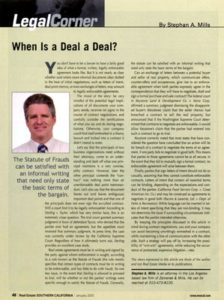 By Stephan A. Mills
By Stephan A. Mills
You don’t have to be a lawyer to have a fairly good idea of what a formal, written, legally-enforceable agreement looks like. But it is not nearly as clear whether (and when) more informal documents often drafted in the heat of initial negotiations, such as letters of intent, deal point memos, or even exchanges of letters, may amount to legally enforceable agreements.
The moral of the story: be very mindful of the potential legal implications of all documents your company sends, receives (or signs) in the course of contract negotiations, and carefully consider the ramifications of what you say and do during negotiations. Otherwise, your company could find itself embroiled in a thorny lawsuit and locked into a contract it didn’t intend to enter.
Let’s say that the principals of two business organizations meet without their attorneys, come to an understanding and dash off what one principal maintains is a very concise, pithy contract. However, later the other principal contends the “contract” was nothing more than an unenforceable deal point memorandum. Let’s also say that the document leaves out (and leaves ambiguous) important deal points and that one of the principals does not even sign the so-called contract. Will a court find it to be legally enforceable? According to Sterling v. Taylor, which has very similar facts, this is an extremely close question. The trial court granted summary judgment in favor of defendant Taylor, who denied that the parties ever had an agreement, but the appellate court reversed that summary judgment. At press time, the case was currently under review by the California Supreme Court. Regardless of how it ultimately turns out, Sterling provides an excellent case study.
Real estate agreements must be in writing and signed by the party against whom enforcement is sought, according to a rule known as the Statute of Frauds (the rule merely specifies that certain types of contracts must be in writing to be enforceable, and has little to do with fraud). So one key issue, in the event that Sterling is allowed to proceed to trial, will be whether or not the parties’ writings were specific enough to satisfy the Statute of Frauds. Generally, the statute can be satisfied with an informal writing that need only state the basic terms of the bargain.
Can an exchange of letters between a potential buyer and seller of real property, which communicate offers, counter-offers and acceptances, give rise to an enforceable agreement when both parties expressly agree in the correspondence that they will have to negotiate, draft and sign a formal purchase and sale contract? The federal court in Keystone Land & Development Co. v. Xerox Corp. affirmed a summary judgment dismissing the disappointed buyer’s (Keystone) claim that the seller (Xerox) had breached a contract to sell the real property, but announced that if the Washington Supreme Court determined that contracts to negotiate are enforceable, it would allow Keystone’s claim that the parties had entered into such a contract to go to trial.
Keystone correctly noted that most states that have considered the question have concluded that an action will lie for breach of a contract to negotiate the terms of an agreement, if one party fails to negotiate in good faith. This means that parties to those agreements cannot be at all secure that, in the event that they fail to mutually sign a formal contract, no enforceable agreement will arise between them.
Finally, parties that sign letters of intent should not do so casually, assuming that they cannot constitute enforceable contracts. Letters of intent that contain all essential terms can be binding, depending on the expectations and conduct of the parties, (California Food Service Corp. vV. Great American Ins. Co.) and may be construed as agreements to negotiate in good faith (Racine & Laramie, Ltd. v. Dept. of Parks & Recreation). While language can be inserted in letters of intent specifying that they are non-binding, it may not determine the issue if surrounding circumstances indicate that the parties actually intended otherwise.
By keeping the principles discussed in this article in mind during contract negotiations, you and your company can avoid becoming unwittingly enmeshed in a contract, while maintaining a line of communication with the other side. Such a strategy will pay off by increasing the possibility of “win-win” agreements, while reducing the occurrence of protracted, expensive litigation.
Stephan A. Mills is an attorney with Zemanek & Mills in Los Angeles. He can be reached at (310) 473-8100.

